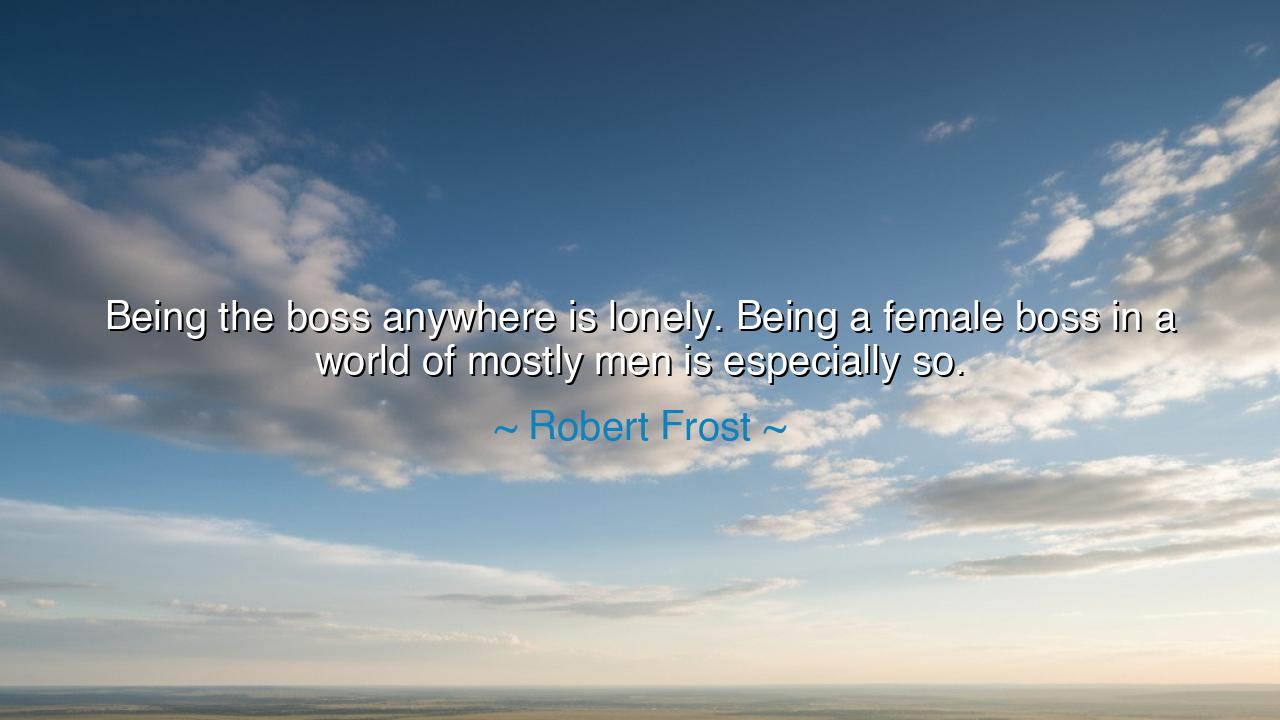
Being the boss anywhere is lonely. Being a female boss in a world
Being the boss anywhere is lonely. Being a female boss in a world of mostly men is especially so.






Hear, O seekers of truth and students of endurance, the solemn words attributed to Robert Frost: “Being the boss anywhere is lonely. Being a female boss in a world of mostly men is especially so.” Within this saying is not merely a commentary on power, but a reflection on the burdens of leadership, the weight of solitude, and the sharper struggles faced by women who dare to rise where few of their sex have stood before. For Frost unveils a truth that is at once universal and particular: that all leaders walk a lonely road, yet women, in a world of men, walk it doubly so.
The meaning of the first half of the saying is eternal. To be the boss, the one who commands, decides, and bears responsibility, is to stand apart from others. Friendship is strained by authority, trust is tempered by hierarchy, and the higher one climbs, the thinner the air becomes. The leader must often endure silence where others share comfort, for choices must be made that are not popular, and burdens carried that cannot be explained. This is the loneliness of command, found alike in kings, generals, poets, and chiefs of households.
But the second half of the saying cuts deeper, revealing the particular pain of being a female boss. In a world long ordered by men, women who ascend to power face not only the solitude of leadership but also the suspicion of a society that has resisted their presence in such places. Every decision they make is scrutinized more harshly; every failure, magnified; every triumph, measured against the expectation of men. Thus the solitude is not only personal but cultural, a solitude enforced by the structures of the age.
History offers countless examples. Consider Cleopatra, Queen of Egypt. She was a ruler of immense intelligence and cunning, yet in the eyes of Rome she was not celebrated as sovereign but dismissed as temptress. Her authority, though real and powerful, was undermined by the scorn of those who could not accept that a woman could rule men. Or think of Elizabeth I of England, who once declared herself to have “the heart and stomach of a king.” She stood firm in her loneliness, for she knew that to show weakness was to invite ruin. Their paths remind us that women in power must often wear armor twice as heavy as their male counterparts.
Nor is this truth confined to ancient history. In modern times, leaders such as Golda Meir, Indira Gandhi, and Margaret Thatcher stood in the highest offices of their nations, surrounded by councils of men. Their burdens were immense, their decisions harsh, their reputations divided. Yet in each of their lives, we see the echo of Frost’s saying: to be the boss is lonely, but to be a woman among men in power is to endure that loneliness sharpened by prejudice and isolation.
The lesson, O listener, is both sobering and empowering. If you are called to lead, know that solitude will walk beside you. If you are a woman called to lead in a world that still leans toward men, expect the solitude to be deeper. Yet do not let it deter you. For loneliness is not a curse but a companion of greatness. It proves that you walk where few can follow, and it forges in you a strength unbreakable.
Therefore, in practice, embrace the path of leadership with courage. Do not fear loneliness, but prepare for it, filling your spirit with purpose so that solitude becomes strength rather than sorrow. If you are a female boss, remember that your struggles are not only your own but those of generations who will follow; your endurance lights their path. And for those who walk beside such leaders, give them not suspicion but support, for their burden is already heavy. In this way, the loneliness of leadership may yet be tempered by solidarity, and the world may learn to honor strength not only in men, but in women as well.






AAdministratorAdministrator
Welcome, honored guests. Please leave a comment, we will respond soon